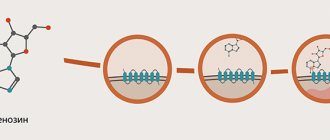We hope you don't drink instant. And that's why.
Just four letters connect millions of people around the world. The army of coffee lovers is growing every day.
The taste of coffee is wonderful, but incomprehensible. You need to learn to understand and love it, and only then enjoy it.
— Gustave Flaubert
Many of us love coffee, but didn’t come to it right away. Personally, at first I didn’t understand why drink coffee? What does it give? It doesn't charge me! Is there something wrong?
I delved deeper into the topic and everything fell into place.
What's in coffee
The structure of the coffee bean is simple. Like any cereal crop, there is an outer and inner shell. As coffee matures, two alkaloids accumulate in it:
- caffeine – in the outer shell;
- theobromine - in the inner shell.
When we make coffee from whole beans, raw and ground, we get a drink that contains both alkaloids.
Proven facts about coffee
- Caffeine is considered a narcotic drug (albeit a very “weak” one compared to its “brothers”).
- The stimulant is addictive. But caffeine, like sweets, energy drinks and fast food, makes you want to use it again, besides, caffeine in different doses is also found in some other products (that is, it is used unnoticed and unconsciously), and this is fraught with problems with health and mental state and excess weight.
- Tablet coffee is absolutely equal in impact to its counterpart in a cup. Simply drinking a cappuccino with lush creamy foam and a piece of chocolate is much more pleasant than swallowing a pill, even if it promises a surge of vigor and strength.
Coffee is unique in that it works well for those who tried it for the first time, as well as for avid drinkers. It is noteworthy that the “stimulant” can both save from a sleepy state and provoke it. If possible, it is better to replace coffee with green tea or invigorating freshly squeezed juice. The effect on the body will be similar, but the harm will be much less.
How does coffee work?
Coffee is a very personal drink. It, like cognac, cannot be drunk in mugs!
— Sir Winston Leonard Spencer-Churchill
Caffeine begins to act in the body almost instantly :
- constricts the blood vessels of all organs;
- dilates renal vessels.
A little theory.
Caffeine is colorless or white bitter crystals. Is a psychostimulant. In small doses it has a stimulating effect on the nervous system. With prolonged use, it can cause mild dependence - theism (disease). In large doses it causes exhaustion.
The duration of the invigorating effect of coffee is 20-25 minutes. Blood pressure increases in all organs and blood flow in the kidneys improves. The kidneys begin to receive better blood supply. This is partly why many people want to go to the restroom.
When caffeine has played its “symphony”, the second alkaloid appears on the scene - theobromine . Theobromine is a white crystalline powder with a slightly bitter taste.
Theobromine has the exact opposite :
- dilates the blood vessels of all organs;
- constricts renal vessels.
Systemic pressure decreases and renal blood flow deteriorates. A person begins to feel a slight tugging sensation in the kidneys.
, a glass of clean water is brought along with a cup of coffee .
A decent coffee shop differs from an indecent one in that the second (decent) one always serves water with coffee, while the first (indecent) one only serves coffee.
Removing caffeine from the body
Milk in coffee softens the harmful effects on the body.
Caffeine acts from 2 to 7 hours, depending on the dose taken. Residues of the substance can remain in the body for up to 8-14 hours. It should be borne in mind that women need a little more time to completely eliminate caffeine from the body than men.
Drinking plenty of liquid will help reduce the level of the substance. Regular drinking water removes caffeine through the kidneys. In addition, it is possible to reduce the effect of coffee on the body in advance by adding milk or cream or ice cream to the drink during preparation.
Attention: how to drink coffee correctly
You drank a cup of coffee. After 20 minutes, drink a glass of water . Exactly like that and in that sequence.
Thus, prevent the phase of impaired water-salt metabolism: do not allow the kidneys to fall into a state of impaired blood flow. Live and learn.
There is only one “but”: all of the above applies to bean coffee.
Why does caffeine “invigorate”?
First, when caffeine enters the body, it mimics the neurohormone adenosine, which slows down nerve impulses and causes drowsiness.
Caffeine blocks adenosine receptors in the brain and other organs, preventing this substance from binding to them. Thus, it suppresses relaxation, increases attention and reaction speed. Secondly, caffeine stimulates the release of the hormone adrenaline, which increases the heart rate and blood pressure, and also increases blood flow to the muscles and provokes the entry of glucose into the blood from its depot in the liver. Third, caffeine increases levels of the neurohormone dopamine in the brain. This substance is responsible for feelings of well-being and happiness. It is the feeling of vigor and lift after a good cup of coffee that causes caffeine addiction. Caffeine: where and how much
We tell you where to look for caffeine, what its content in products depends on, and how to calculate how much caffeine you consume daily.
Secrets of instant coffee
When the caffeine fraction is extracted from coffee, the outer shell of the grain is removed. This part goes to medications, caffeine and caffeine-containing drinks (for example, citramon, energy drinks, and so on).
The inner shell of the grain is used to produce instant and granulated coffee.
An interesting fact that makes you think. The Americans are trying to push through a law so that all cans of granulated coffee should be labeled “decaffeinated coffee . Some manufacturers are already writing.
In fact, any granulated or instant coffee contains from 5% to 10% caffeine fractions. As a rule, you do not feel any invigorating effect, blood pressure does not increase, and after this coffee you want to sleep .
You should drink instant coffee in the evening (closer to the night) - you will sleep better. That's the whole effect.
What makes you sensitive to caffeine?
- With age, sensitivity to caffeine increases.
- Women are more sensitive to caffeine than men.
- Cardiovascular disease increases susceptibility to the effects of caffeine.
- Irregular caffeine consumption. The less often a person drinks drinks rich in caffeine, the more sensitive he is to this substance.
- Interaction with medications. The compatibility of the medicine with caffeine is usually written in the instructions for use.
- Reduced weight increases sensitivity to caffeine.
Then what kind of coffee should you drink?
We only get the caffeine effect from whole bean coffee. After this, we must be prepared for the onset of the theobromine phase - the opposite effect.
The theobromine stage occurs when drinking any type of coffee, no matter what quality.
Some varieties maintain the “caffeine stage” for up to 30 minutes. But then you still get the theobromine stage. Its duration is much longer, about 60-70 minutes.
Everyone can feel this for themselves. The phase of activation and surge of energy feels good, after which you want to relax a little.
Therefore, it is important to remember: by drinking plain water at the right time, the stage of the negative effect is reduced. You prevent deterioration of renal blood flow.
Therefore, now knowing the mechanism of action of coffee, make it a rule: always drink water after a cup of coffee. Your kidneys will thank you!
What to drink from coffee in Russia
Many people in Russia only have access to instant coffee. It can be cheap. And dear.
When buying instant coffee, remember: THERE IS NO DIFFERENCE.
Typical situation. Beautiful packaging, high price. Having prepared it, we get the opposite effect: there is no vigor, and after 20-25 minutes the theobromine phase “creeps up”. I want to sleep, my blood pressure does not increase (which is a definite plus for hypertensive patients). Without knowing this mechanism, people find themselves in unpleasant, sometimes even tragic situations.
For example, a truck driver or taxi driver, driving out into the night, drinks several cups of instant coffee. Naturally, he does not receive the expected cheerfulness. After 25–30 minutes, theobromine begins to act, and the person falls asleep while driving. This effect is also called the “30 kilometer” effect .
Therefore, in situations where you need to be alert, it is not recommended to take instant or granulated coffee with you - only ground beans or, even better, strong tea. Leaf tea (including green tea) contains caffeine without theobromine, which will provide the necessary energy.
How many cups of coffee can you drink without harming your health?
The aroma of coffee alone in the morning already becomes the key to cheerfulness for many people. But, of course, everyone understands that the invigorating properties of this drink are due to the caffeine it contains, a substance that affects the body in a certain way.
The debate about how many cups of coffee you can drink per day has been going on for many years, and sometimes the opinions of experts differ in the most dramatic way. But most of the research agrees that a person should focus on his own well-being - for example, residents of Sweden, Norway, Finland and Denmark drink an average of 10 cups of coffee a day and feel great. Why is this happening?
Harsh production statistics
Let's look at the statistics of coffee production around the world from 2001 to 2015. Data is in thousands and 60 kilogram bags.
Information taken from the open source International Coffee Organization.
In order to visually see the dynamics, let's build a diagram .
The numbers reflect the scale of coffee consumption.
A pattern can be drawn: when the world economy is in a fever, the demand for coffee grows and, as a result, its production.
Caffeine content in drinks
On average, ground natural coffee contains 70-140 mg of caffeine in 1 cup (41-82 mg per 100 ml).
According to scientists, in instant coffee (both freeze-dried and powdered) the amount of caffeine is 30-40% less and ranges from 30 to 90 mg per 1 cup (17.6-53 mg per 100 ml).
The concentration of caffeine depends on the type of coffee beans (for example, “Robusta” has 2 times more than “Arabica”), the duration of roasting and various technological features of production.
The table shows the caffeine content in the most popular coffee drinks and other products.
| Drink | Caffeine per serving | Caffeine per 100 ml drink |
| Espresso | 59 mg (30 ml) | 196 mg |
| Americano | 68 mg (70 ml) | 97 mg |
| Cappuccino | 68 mg (180 ml) | 38 mg |
| Black tea | 80-100 mg (200 ml) | 40-50 mg |
| Green tea | 40-60 mg (200 ml) | 20-30 mg |
| Coca-Cola | 55 mg (500 ml) | 11 mg |
| Pepsi-Cola | 30 mg (500 ml) | 6 mg |
| Energetic drinks | 100-175 mg (500 ml) | 20-35 mg |
Thus, different types of coffee and coffee drinks contain different amounts of caffeine. Its content is influenced by many factors: from the type of grain to the duration of “brewing.”
How coffee changes your mind
Finally, a very interesting fact. Australian scientists from the University of Queensland have found that a person who has consumed a certain dose of caffeine is more easily susceptible to psychological influence .
This conclusion was made based on experiment. 140 volunteers took part in it. Each of the subjects was asked in advance about their position on a specific topic. They divided everyone into two groups: the first group was asked to drink several cups of coffee, while the second group was left without a drink.
Counter-arguments against the participants' positions were then provided. And the most interesting thing: those who did not drink the coffee drink did not change their opinion. Lovers of the strong drink were inclined to change their point of view , and some of them changed their minds after listening to the arguments.
Scientists characterize these actions by the fact that a person who drinks coffee experiences a kind of euphoria, and therefore is more relaxed in his behavior and judgment.
Next time at negotiations, I will probably refuse a cup of aromatic coffee. And I advise you 
( 12 votes, overall rating: 4.83 out of 5)











